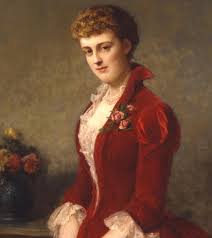Ethan Frome Page #6
Ethan Frome is a 1911 book by American author Edith Wharton. It is set in the fictitious town of Starkfield, Massachusetts. The novel was adapted into a film, Ethan Frome, in 1993.
As he stood in the darkness outside the church these memories came back with the poignancy of vanished things. Watching Mattie whirl down the floor from hand to hand he wondered how he could ever have thought that his dull talk interested her. To him, who was never gay but in her presence, her gaiety seemed plain proof of indifference. The face she lifted to her dancers was the same which, when she saw him, always looked like a window that has caught the sunset. He even noticed two or three gestures which, in his fatuity, he had thought she kept for him: a way of throwing her head back when she was amused, as if to taste her laugh before she let it out, and a trick of sinking her lids slowly when anything charmed or moved her. The sight made him unhappy, and his unhappiness roused his latent fears. His wife had never shown any jealousy of Mattie, but of late she had grumbled increasingly over the house-work and found oblique ways of attracting attention to the girl's inefficiency. Zeena had always been what Starkfield called “sickly,” and Frome had to admit that, if she were as ailing as she believed, she needed the help of a stronger arm than the one which lay so lightly in his during the night walks to the farm. Mattie had no natural turn for housekeeping, and her training had done nothing to remedy the defect. She was quick to learn, but forgetful and dreamy, and not disposed to take the matter seriously. Ethan had an idea that if she were to marry a man she was fond of the dormant instinct would wake, and her pies and biscuits become the pride of the county; but domesticity in the abstract did not interest her. At first she was so awkward that he could not help laughing at her; but she laughed with him and that made them better friends. He did his best to supplement her unskilled efforts, getting up earlier than usual to light the kitchen fire, carrying in the wood overnight, and neglecting the mill for the farm that he might help her about the house during the day. He even crept down on Saturday nights to scrub the kitchen floor after the women had gone to bed; and Zeena, one day, had surprised him at the churn and had turned away silently, with one of her queer looks. Of late there had been other signs of her disfavour, as intangible but more disquieting. One cold winter morning, as he dressed in the dark, his candle flickering in the draught of the ill-fitting window, he had heard her speak from the bed behind him. “The doctor don't want I should be left without anybody to do for me,” she said in her flat whine. He had supposed her to be asleep, and the sound of her voice had startled him, though she was given to abrupt explosions of speech after long intervals of secretive silence. He turned and looked at her where she lay indistinctly outlined under the dark calico quilt, her high-boned face taking a grayish tinge from the whiteness of the pillow. “Nobody to do for you?” he repeated. “If you say you can't afford a hired girl when Mattie goes.” Frome turned away again, and taking up his razor stooped to catch the reflection of his stretched cheek in the blotched looking-glass above the wash-stand. “Why on earth should Mattie go?” “Well, when she gets married, I mean,” his wife's drawl came from behind him. “Oh, she'd never leave us as long as you needed her,” he returned, scraping hard at his chin. “I wouldn't ever have it said that I stood in the way of a poor girl like Mattie marrying a smart fellow like Denis Eady,” Zeena answered in a tone of plaintive self-effacement. Ethan, glaring at his face in the glass, threw his head back to draw the razor from ear to chin. His hand was steady, but the attitude was an excuse for not making an immediate reply. “And the doctor don't want I should be left without anybody,” Zeena continued. “He wanted I should speak to you about a girl he's heard about, that might come--” Ethan laid down the razor and straightened himself with a laugh. “Denis Eady! If that's all, I guess there's no such hurry to look round for a girl.” “Well, I'd like to talk to you about it,” said Zeena obstinately. He was getting into his clothes in fumbling haste. “All right. But I haven't got the time now; I'm late as it is,” he returned, holding his old silver turnip-watch to the candle. Zeena, apparently accepting this as final, lay watching him in silence while he pulled his suspenders over his shoulders and jerked his arms into his coat; but as he went toward the door she said, suddenly and incisively: “I guess you're always late, now you shave every morning.” That thrust had frightened him more than any vague insinuations about Denis Eady. It was a fact that since Mattie Silver's coming he had taken to shaving every day; but his wife always seemed to be asleep when he left her side in the winter darkness, and he had stupidly assumed that she would not notice any change in his appearance. Once or twice in the past he had been faintly disquieted by Zenobia's way of letting things happen without seeming to remark them, and then, weeks afterward, in a casual phrase, revealing that she had all along taken her notes and drawn her inferences. Of late, however, there had been no room in his thoughts for such vague apprehensions. Zeena herself, from an oppressive reality, had faded into an insubstantial shade. All his life was lived in the sight and sound of Mattie Silver, and he could no longer conceive of its being otherwise. But now, as he stood outside the church, and saw Mattie spinning down the floor with Denis Eady, a throng of disregarded hints and menaces wove their cloud about his brain.... II As the dancers poured out of the hall Frome, drawing back behind the projecting storm-door, watched the segregation of the grotesquely muffled groups, in which a moving lantern ray now and then lit up a face flushed with food and dancing. The villagers, being afoot, were the first to climb the slope to the main street, while the country neighbours packed themselves more slowly into the sleighs under the shed. “Ain't you riding, Mattie?” a woman's voice called back from the throng about the shed, and Ethan's heart gave a jump. From where he stood he could not see the persons coming out of the hall till they had advanced a few steps beyond the wooden sides of the storm-door; but through its cracks he heard a clear voice answer: “Mercy no! Not on such a night.”
Translation
Translate and read this book in other languages:
Select another language:
- - Select -
- 简体中文 (Chinese - Simplified)
- 繁體中文 (Chinese - Traditional)
- Español (Spanish)
- Esperanto (Esperanto)
- 日本語 (Japanese)
- Português (Portuguese)
- Deutsch (German)
- العربية (Arabic)
- Français (French)
- Русский (Russian)
- ಕನ್ನಡ (Kannada)
- 한국어 (Korean)
- עברית (Hebrew)
- Gaeilge (Irish)
- Українська (Ukrainian)
- اردو (Urdu)
- Magyar (Hungarian)
- मानक हिन्दी (Hindi)
- Indonesia (Indonesian)
- Italiano (Italian)
- தமிழ் (Tamil)
- Türkçe (Turkish)
- తెలుగు (Telugu)
- ภาษาไทย (Thai)
- Tiếng Việt (Vietnamese)
- Čeština (Czech)
- Polski (Polish)
- Bahasa Indonesia (Indonesian)
- Românește (Romanian)
- Nederlands (Dutch)
- Ελληνικά (Greek)
- Latinum (Latin)
- Svenska (Swedish)
- Dansk (Danish)
- Suomi (Finnish)
- فارسی (Persian)
- ייִדיש (Yiddish)
- հայերեն (Armenian)
- Norsk (Norwegian)
- English (English)
Citation
Use the citation below to add this book to your bibliography:
Style:MLAChicagoAPA
"Ethan Frome Books." Literature.com. STANDS4 LLC, 2025. Web. 23 Feb. 2025. <https://www.literature.com/book/ethan_frome_264>.








Discuss this Ethan Frome book with the community:
Report Comment
We're doing our best to make sure our content is useful, accurate and safe.
If by any chance you spot an inappropriate comment while navigating through our website please use this form to let us know, and we'll take care of it shortly.
Attachment
You need to be logged in to favorite.
Log In